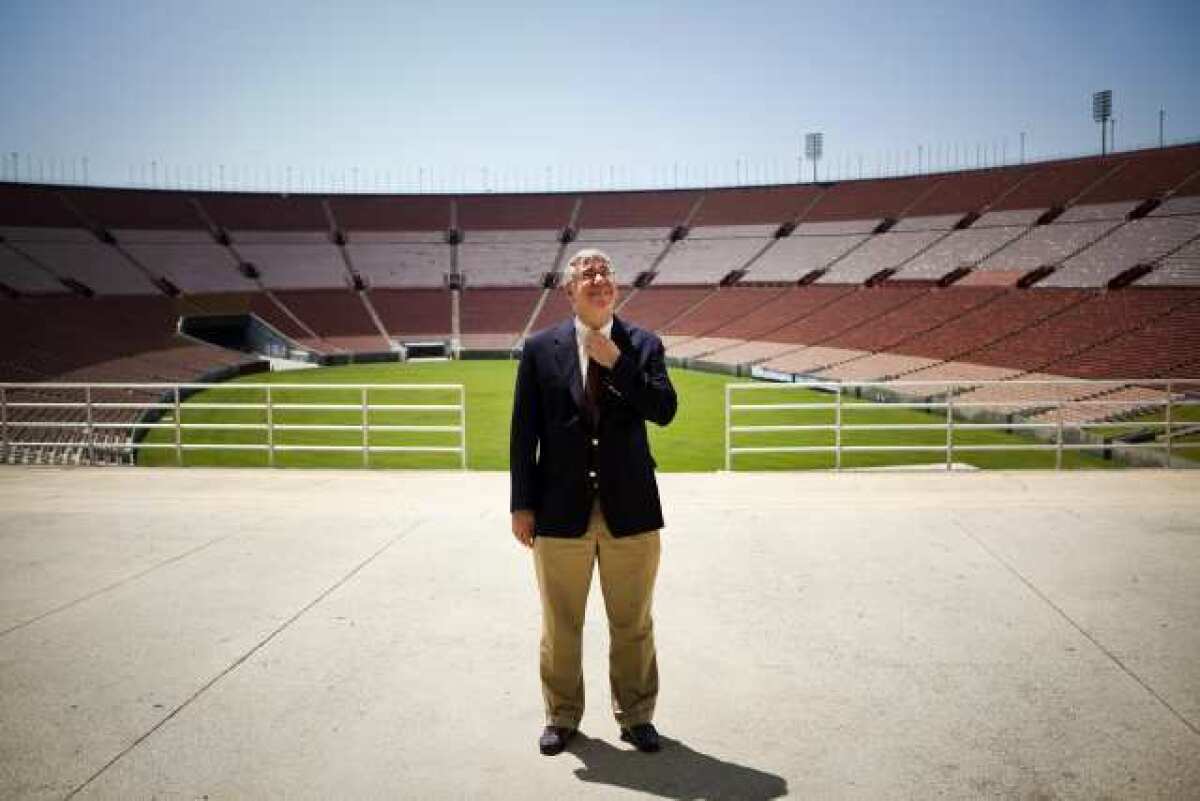State political watchdog is investigating L.A. Coliseum chief

- Share via
State authorities are investigating whether the head of the Los Angeles Memorial Coliseum illegally sought a job with USC even as he was responsible for protecting taxpayers in talks to surrender control of the stadium to the university.
The probe is focused on whether Coliseum Interim General Manager John Sandbrook violated conflict of interest laws while negotiating a proposed lease to give USC stewardship of the public venue for at least 42 years, said Gary Winuk, enforcement chief at the Fair Political Practices Commission.
Winuk said a complaint filed with the agency alleges that Sandbrook had discussions with USC about working for the private school after the Coliseum’s governing commission approves the lease, which could happen as early as Monday.
“If you’re a public official,” Winuk said, “once you start negotiating with an outside employer you should not be participating in or influencing any decisions involving the outside employer.”
Through a Coliseum Commission attorney, Sandbrook denied the allegation.
“Mr. Sandbrook has never negotiated with USC on his own behalf for any form of employment with USC, whether part time or full time, or as a consultant,” the attorney, Assistant County Counsel Thomas Faughnan, said in an email.
“Having received a letter today from the FPPC about this allegation, Mr. Sandbrook is looking forward to providing a complete description of the facts of this matter to the FPPC.”
Kristina Raspe, a USC vice president who has helped negotiate the lease, said neither she nor another school administrator involved in the talks “has ever talked to John about a job.”
“Maybe he wanted a job, maybe he hoped for a job … [but] it has never been the university’s intention to retain John Sandbrook as general manager,” Raspe said.
She added, “I did assure people that he would be available to deal with transitional issues.”
USC is not a target of the investigation, Winuk said.
In February, The Times asked the Coliseum Commission for any records relating to Sandbrook’s possible employment by USC after the lease is approved. Faughnan responded that the commission had no such records.
The proposed lease would give USC almost total control over the historic Coliseum, where the school’s football team plays. It would grant USC exclusive use of the Coliseum for all but a few days each year; relinquish to the school naming and advertising rights to the stadium; and allow it to operate, close or even tear down the neighboring Sports Arena.
Sports industry experts say the draft lease is extraordinary because USC essentially would receive all the practical benefits of owning the Coliseum without buying it. Under the agreement, USC has promised to fund about $70 million in improvements to the 88-year-old stadium and pick up the commission’s roughly $1-million annual rent paid to the state, which owns the land.
A 2005 report for the governor’s office estimated the value of the Coliseum complex at $240 million to $400 million.
A majority of Coliseum commissioners has been pushing for the lease since a financial scandal, which followed reports in The Times, pushed the stadium to the brink of insolvency and triggered a district attorney’s investigation that has led to the indictments of Sandbrook’s predecessor and five other people. The commission has lost millions of dollars in the last few years and has been unable to pay for Coliseum upgrades it promised USC in its current lease.
Sandbrook, a retired University of California administrative manager, was recruited for the Coliseum post last year by an old college friend, county Supervisor Zev Yaroslavsky, who is on the stadium commission.
Several months into his tenure, Sandbrook, who had no experience as a stadium executive, came under fire for allowing some Coliseum managers to continue collecting perks such as payments for luxury car leases and unlimited use of a stadium gas card. One manager was allowed to collect Visa reward points from hundreds of thousands of dollars in government purchases he made on his personal credit card.
Sandbrook was also criticized for boosting his annual UC pension, which is nearly $183,000, by accumulating 418 days of sick leave, the equivalent of about 35 years’ worth. He is paid $208,000 a year by the Coliseum, on top of his pension.
More to Read
Sign up for Essential California
The most important California stories and recommendations in your inbox every morning.
You may occasionally receive promotional content from the Los Angeles Times.












